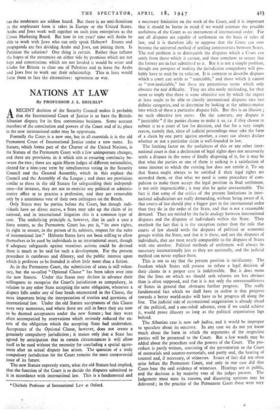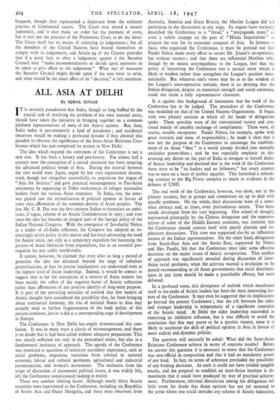NATIONS AT LAW
By PROFESSOR J. L. BRIERLY*
ARECENT decision of the Security Council makes it probable that the International Court of Justice is to have the British- Albanian dispute for its first contentious business. Some account therefore of the constitution and powers of the Court and of its place in the new international order may be opportune.
Formally the Court is a new one, but in all essentials it is the old Permanent Court of International Justice under a new name. Its Statute, which forms part of the Charter of the United Nations, is the Statute of the Permanent Court with a few unimportant changes, and there are provisions in it which aim at ensuring continuity be- tween the two ; there are again fifteen judges of different nationalities, elected for a nine-year term by simultaneous voting in the Security Council and the General Assembly, which in this replace the Council and the Assembly of the League ; and there are provisions similar to those in the old Statute for safeguarding their independ- ence—for instance, they are not to exercise any political or adminis- trative office or to practise a profession, and they are removable only by a unanimous vote of their own colleagues on the Bench.
Only States may be parties before the Court, but though indi- viduals have no direct access, a State may take up the claim of its national, and in international litigation this is a common type of case. The underlying principle is, however, that in such a case a State asserts, as the Permanent Court has put it, "its own rights, its right to ensure, in the person of its subjects, respect for the rules of international law." Hitherto States have not been willing to allow themselves to be sued by individuals in an international court, though if adequate safeguards against vexatious actions could be devised there is much to be said for such a development. For the present procedure is cumbrous and dilatory, and the public interest upon which it professes to be founded is often little more than a fiction.
As in the Permanent Court, the submission of cases is still volun- tary, but the so-called "Optional Clause" has been taken over into the new Statute. Under this States may declare in advance their willingness to recognise the Court's jurisdiction as compulsory, in relation to any other State accepting the same obligation, whenever a dispute falls under any of four heads enumerated in the Clause, the most important being the interpretation of treaties and questions of international law. Under the old Statute acceptances of this Clause were very numerous, and where these are still in Bocce they are now to be deemed acceptances under the new Statute ; but they were often accompanied by reservations which seriously reduced the ex- tent of the obligation which the accepting State had undertaken. Acceptance of the Optional Clause, however, does not create a genuinely compulsory jurisdiction ; it means only that a State has agreed by anticipation that in certain circumstances it will allow itself to be sued without the necessity for concluding a special agree- ment after an actual dispute has arisen. The question of a truly compulsory jurisdiction for the Court remains the most controversial issue of its future.
The new Statute expressly states, what the old Statute had implied, that the function of the Court is to decide the disputes submitted to it in accordance with internatiSnal law. This is a fundamental and * Chichele Professor of International Law at Oxford.
a necessary limitation on the work of the Court, and it is important that it should be borne in mind if we would estimate the possible usefulness of the Court as an instrument of international order. For not all disputes are capable of settlement on the basis of rules of law, and it is therefore idle to suppose that the Court can ever become the universal method of settling controversies between States. The real problem is to distinguish the disputes which a Court can settle from those which it cannot, and then somehow to secure that the former are in fact submitted to it. But it is not a simple problem, though any prospect of making the jurisdiction compulsory will pro- bably have to wait for its solution. It is common to describe disputes which a court can settle as " justiciable," and those which it cannot as " non-justiciable," but these are pretentious terms which only obscure the real difficulty. They are also easily misleading, for they seem to imply that there is some objective test by which the expert at least ought to be able to classify international disputes into two definite categories, and to determine by looking at the subject-matter into which of these a particular dispute falls. But this is an illusion ; no such objective test exists. On the contrary, any dispute is " justiciable " if the parties choose to make it so, i.e. if they choose to submit it to a court of law for decision, and that for a very simple reason, namely that, since all judicial proceedings must take the form of a claim by one party against another, a court can always declare whether or not a particular claim is well-founded in law.
The limiting factor on the usefulness of this or any other inter- national court is that a declaration of legal rights does not necessarily settle a dispute in the sense of finally disposing of it, for it may be that what the parties or one of them is seeking is a satisfaction of some interest to which the existing law does not entitle it. To say that States ought always to be satisfied if their legal rights are accorded them, or that what we need is some procedure of com- pulsion to make them accept the legal position in final settlement, is not only impracticable ; it may also be quite unreasonable. The fact is that some of the critics of the present limitations in inter- national adjudication are really demanding, without being aware of it, that courts of law should play a bigger part in the international order than they do in the order of the State, and that is not a reasonable demand. They are misled by the facile analogy between international disputes and the disputes of individuals within the State. They overlook the fact that it is the exception rather than the rule that courts of law should settle the disputes of political or economic groups within the State, and that it is these, and not the disputes of individuals, that are most nearly comparable to the disputes of States with one another. Political methods of settlement will always be necessary internationally just as they are nationally, and the judicial method can never replace them.
This is not to say that the present position is satisfactory. The freedom which States still possess to refuse a legal decision of their claims in a proper case is indefensible. But it does mean that the lines on which we should seek reforms are less obvious than is often supposed, and that it is not only the unreasonableness of States in general that obstructs further progress. The really fundamental fact which we shall have to realise is that progress towards a better world-order will have to be progress all along the line. The judicial side of international orgInisation is already ahead of the political, and a one-sided advance, even if we could achieve it, would prove illusory so long as the political organisation lags behind.
The Albanian case is now sub judice, and it would be improper to speculate about its outcome. In any case we do not yet know much about the form in which the arguments of the respective parties will be presented to the Court. But a few words may be added about the procedure and the powers of the Court. The pro- cedure is partly written, consisting of the presentation to the Court of memorials and counter-memorials, and partly oral, the hearing of counsel and, if necessary, of witnesses. Issues of fact did not often arise before the Permanent Court, and only in one case did that Court hear the oral evidence of witnesses. Hearings are in public, and the decision is by majority vote of the judges present. The judgement must state its reasons, and dissenting opinions may be delivered ; in the practice of the Permanent Court these were very
frequent, though they represented a departure from the ordinary practice of Continental courts. The Court may award a money indemnity, and it may make an order for the payment of costs, but it was not the practice of the Permanent Court to do the latter. The Court itself has no means of enforcing its judgements ; but all the members of the United Nations have bound themselves to comply with its judgements, and Article 94 of the Charter provides that if a party fails to obey a judgement against it the Security Council may " make recommendations or decide upon measures to be taken to give effect to the judgement." What sort of measures the Security Council might decide upon if the case were to arise, and what would be the exact effect of its " decision," is left uncertain.



































 Previous page
Previous page